Lisa Marshall
 What made Tuesday’s verdict so unique, and will it lead to lasting change? In this Q&A, three CU Boulder experts in law; sociology, crime trends and policing; and Africana studies and criminology give their takes.
What made Tuesday’s verdict so unique, and will it lead to lasting change? In this Q&A, three CU Boulder experts in law; sociology, crime trends and policing; and Africana studies and criminology give their takes.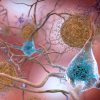 More than 70% of neurological diseases, including Alzheimer's disease and the concussion-related disorder CTE, are believed to be fueled by protein clusters called tau aggregates. A new study sheds light on how they damage brain cells, and could ultimately lead to new therapies for such "tauopathies."
More than 70% of neurological diseases, including Alzheimer's disease and the concussion-related disorder CTE, are believed to be fueled by protein clusters called tau aggregates. A new study sheds light on how they damage brain cells, and could ultimately lead to new therapies for such "tauopathies." Grief, anger, powerlessness and worry––in a tragic event, all of these emotions are valid and some may feel all of them over time, says Sona Dimidjian, director of the Renée Crown Wellness Institute. Learn more.
Grief, anger, powerlessness and worry––in a tragic event, all of these emotions are valid and some may feel all of them over time, says Sona Dimidjian, director of the Renée Crown Wellness Institute. Learn more.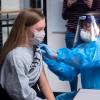 CU Boulder was the first site to roll out a federally-funded study led by the COVID-19 Prevention Network at the Fred Hutchinson Cancer Research Center in Seattle. Study leaders vaccinated 11 of the roughly 700 CU Boulder student volunteers who will ultimately participate.
CU Boulder was the first site to roll out a federally-funded study led by the COVID-19 Prevention Network at the Fred Hutchinson Cancer Research Center in Seattle. Study leaders vaccinated 11 of the roughly 700 CU Boulder student volunteers who will ultimately participate.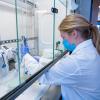 For nearly one year, a group of scientists and volunteers from across the university has met seven days a week, often sleeping just a few hours a night, to bring students back to campus safely.
For nearly one year, a group of scientists and volunteers from across the university has met seven days a week, often sleeping just a few hours a night, to bring students back to campus safely.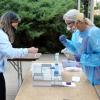 New research finds that only one in five college students who tested positive for COVID-19 while living in residence halls infected their roommates.
New research finds that only one in five college students who tested positive for COVID-19 while living in residence halls infected their roommates.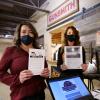 A nation-wide effort first launched in New Hampshire in 2009 is enlisting gun retailers in the fight against suicide. Researchers at CU Boulder want to learn how it's working and what can be done to make it work even better.
A nation-wide effort first launched in New Hampshire in 2009 is enlisting gun retailers in the fight against suicide. Researchers at CU Boulder want to learn how it's working and what can be done to make it work even better.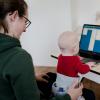 In the years after female faculty members have children, their productivity––in terms of papers published––drops 20 percent. Male faculty see no such decline. Researchers say different roles in parenting are likely to blame and the gap could have long-term impacts on higher education.
In the years after female faculty members have children, their productivity––in terms of papers published––drops 20 percent. Male faculty see no such decline. Researchers say different roles in parenting are likely to blame and the gap could have long-term impacts on higher education.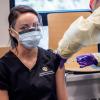 As supply increases, so do questions about how the COVID-19 vaccines work and what they do and don’t do. We caught up with Professor Matt McQueen, director of epidemiology, for answers.
As supply increases, so do questions about how the COVID-19 vaccines work and what they do and don’t do. We caught up with Professor Matt McQueen, director of epidemiology, for answers. Facial recognition technology is now embedded in everything from our phones and computers to surveillance systems at the mall and airport. But it tends to misidentify certain populations and can be used to discriminate. Microsoft Research Fellow Morgan Klaus Scheuerman wants to change that.
Facial recognition technology is now embedded in everything from our phones and computers to surveillance systems at the mall and airport. But it tends to misidentify certain populations and can be used to discriminate. Microsoft Research Fellow Morgan Klaus Scheuerman wants to change that.


